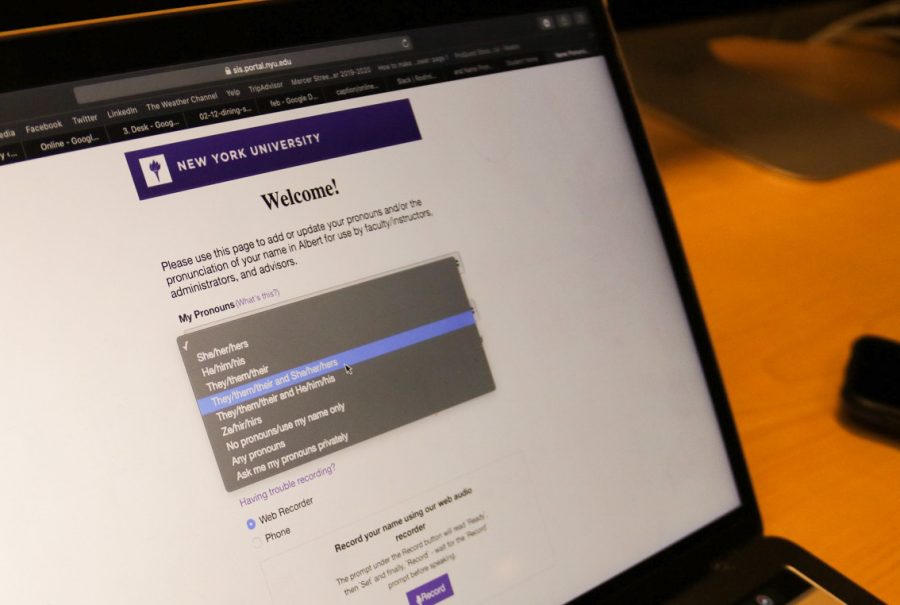Students will now be able to include their pronouns and name pronunciation in Albert, according to a university-wide email from Senior Vice President of Student Affairs Marc Wais.
The decision was made with the counsel of a working group of NYU community members and is part of a string of efforts to make Albert more considerate of all gender identities. The working group primarily focused on gender pronouns, gender-inclusive language and name pronunciation, according to the email.
“With the recommendations of the NYU New York working group in mind, we are excited to share that you now have the option to add your pronouns and record the pronunciation of your name in Albert,” the email reads. “You can have your pronouns displayed to faculty, advisors and administrators in Albert, as well as other NYU systems (e.g., NYU Classes and NYU Connect).”
Students have the option to only disclose their pronouns to administrators and advisors if they are uncomfortable with instructors viewing them. The email also supplied a pronoun and name pronunciation guide, a pronouns toolkit and a PBS article on the psychological effects of name mispronunciation.
Last May, students expressed frustration when a list of donors to the 1831 Fund — an organization raising scholarship money for incoming students — placed on the steps of the Kimmel Center of University Life displayed some donors’ legal names, rather than their correct name chosen in order to reflect their gender identity; this mistake is called deadnaming. Organizers of the effort attributed the deadnaming to defects within Albert.
CAS sophomore Ted Ravago has noted these glitches in Albert, citing instances when the portal reverted to users’ deadnames without notification.
“The Albert system is kinda janky,” Ravago said. “[It] leads to a lot of trans people’s deadnames appearing on emails and such.”
This issue is part of what some students say is a trend of using deadnames and misgendering students at NYU. In the past, NYU students only had the option to put their preferred names on Albert, but several still reported being deadnamed and misgendered by their professors.
“It’s a good step in the right direction,” Ravago said. “I don’t think that this by itself is enough. There are students who say their pronouns in class when they introduce themselves, and they still get misgendered. It happens a lot.”
Ravago added that they did not think professors were doing this in ill will, but the general lack of attention among faculty towards using correct pronouns is still a problem that needs to be remedied.
“There’s a deeper issue,” they said. “I’m not saying that there are a lot of explicitly transphobic professors. I just think there’s a lot of apathy towards the situation.”
The email from NYU mentioned the university’s hopes of encouraging staff to be more mindful of using correct names and pronouns.
“We are offering this option in Albert because students brought these issues to our attention, and we can no longer assume what pronoun(s) students want to use when referring to themselves,” it stated. “Similarly, we need to support faculty and staff in their efforts to pronounce students’ names correctly.”
Steinhardt senior Jordana Lusk echoed Ravago’s statement that allowing students to add their pronouns on Albert is a step in the right direction, but that it isn’t enough.
“It’s honestly about time,” Lusk said. “It’s been a problem for a really long time, and it’s been hurting a lot of students’ feelings. The entire database has to be reworked and updated. Even though they added the new pronouns, there are still situations where students are receiving emails with the wrong names, like a deadname or the wrong pronouns.”
Lusk emphasized her belief that the university should be a safe haven for members of the LGBTQ+ community.
“Especially within the LGBTQ community, we deal with enough family and outside rejection and harassment that NYU should be a safe place,” Lusk said.
Email Lisa Cochran at [email protected].























































































































































